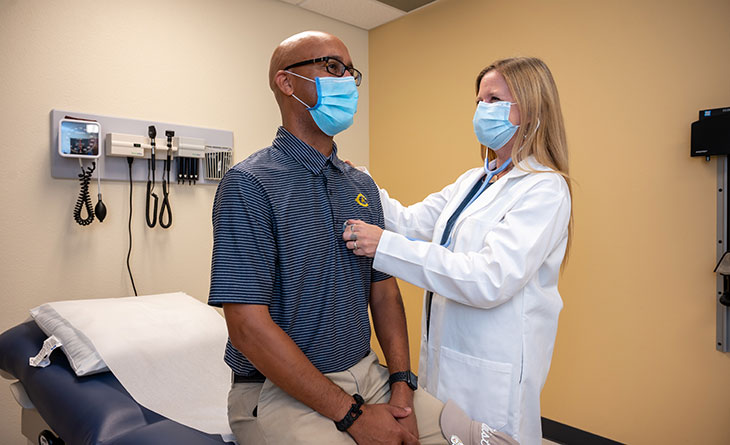Recognizing the Necessary Duty of Medical Care in Comprehensive Wellness Administration and Illness Prevention Strategies
The indispensable function of health care in extensive health monitoring and illness avoidance approaches can not be overstated, as it functions as the foundation for efficient medical care delivery. By focusing on precautionary treatment and fostering enduring patient-provider partnerships, medical care practitioners are distinctively positioned to attend to private health demands while additionally influencing wider neighborhood health end results. Nonetheless, the complexities and difficulties encountered in the execution of these techniques increase crucial concerns concerning how finest to enhance key treatment's performance - doctor. What innovative techniques might boost its influence on both private and public health and wellness?
Interpretation of Medical Care
Although the principle of health care might vary throughout different healthcare systems, it essentially refers to the initial point of get in touch with for patients within the medical care continuum. Health care includes a broad variety of services, consisting of precautionary treatment, medical diagnosis, treatment, and monitoring of chronic problems. It is characterized by its extensive, accessible, and worked with method, ensuring individuals get holistic treatment customized to their private needs.
Main treatment service providers, usually household physicians, internists, or doctors, play an important duty in developing ongoing patient-provider connections. This connection of care fosters depend on and helps with far better health and wellness results via routine surveillance and tailored treatments. The emphasis on a patient-centered method permits the consideration of social, financial, and emotional aspects that affect health and wellness.
In addition, primary care works as an important part in browsing the healthcare system, assisting patients via specialized services when required. By functioning as a main center for health administration, health care not only addresses immediate clinical problems but additionally emphasizes the relevance of total health and preventative measures. Thus, its meaning expands past mere treatment to incorporate an extensive structure for health and wellness promotion and condition avoidance.
Benefits of Preventive Treatment
Preventative care deals countless advantages that dramatically boost specific and neighborhood wellness results. By concentrating on the avoidance of illness and health and wellness problems before they arise, preventative care minimizes the occurrence of severe wellness conditions, consequently reducing health care prices gradually. Early detection with normal screenings and analyses enables prompt interventions, which can protect against the development of diseases, leading to enhanced lifestyle for clients.
Additionally, preventive care promotes health and wellness education and understanding, encouraging individuals to make informed decisions regarding their way of livings and health behaviors. This aggressive technique encourages routine exams, inoculations, and health screenings, which not just profit people yet also add to the overall health and wellness of the community. By lowering the problem of persistent illness and avoiding break outs of transmittable illness, preventative care plays an important role in enhancing public health.
Along with improving specific health end results, preventive care fosters an extra efficient medical care system by lessening the need for substantial therapies and hospitalizations. Ultimately, buying preventive treatment is crucial, as it assists in healthier populations, lowers wellness disparities, and ensures better resource appropriation within the healthcare system.
Duty in Chronic Disease Monitoring
The aggressive strategies used in preventive care are important in the administration of chronic conditions, which typically require continuous interest and resources. Primary care providers play a crucial duty in this context, functioning as the very first point of contact for individuals with persistent problems such as diabetic issues, hypertension, and heart illness. They contribute in developing personalized management strategies that encompass regular surveillance, medication administration, and way of life adjustments.

In addition, health care service providers often use innovation and data analytics to track person progress and identify prospective difficulties early. This positive tracking improves person engagement and equips individuals to take an active function in their wellness administration. Inevitably, the combination of health care into chronic illness management cultivates improved quality of life and minimizes the problem on healthcare systems.
Patient-Provider Relationships

Furthermore, a robust patient-provider connection improves individual interaction and self-management. Service providers who spend time in understanding explanation their individuals' histories, preferences, and inspirations are better furnished to support them in managing their conditions. This customized approach can result in improved wellness outcomes, as clients are more probable to follow suggestions when they feel valued and understood.
Additionally, connection of treatment plays a substantial duty in strengthening these connections. Regular interactions between individuals and providers assist in continuous analysis and adjustments to therapy strategies, which is vital for handling chronic diseases successfully. This connection not just advertises better health and wellness results yet likewise lowers medical care costs by lessening the demand for urgent treatments.
Influence On Neighborhood Health And Wellness
Solid patient-provider connections substantially influence community health outcomes, as they add to a much more engaged and informed population. pcp doctor near me. When clients feel linked to their medical care companies, they are a lot more likely to look for preventive services, abide by therapy plans, and join health-promoting behaviors. This interaction fosters a society of wellness, where individuals prioritize their health and wellness and the health of their community
Moreover, reliable communication in between patients and suppliers improves health and wellness literacy, equipping people to make enlightened decisions concerning their care. This enhanced understanding can lead to reduced prices of chronic diseases, as clients become aggressive in handling their health. Furthermore, solid partnerships assist in the identification of community-specific health difficulties, making it possible for companies to tailor treatments that address regional demands.
Additionally, health care offers as an essential accessibility factor for health and wellness resources, attaching clients with needed solutions and assistance networks. This detailed strategy not only enhances individual health and wellness however likewise enhances neighborhood communication, as citizens function collaboratively to attend to health and wellness variations. Generally, the impact of robust patient-provider connections prolongs beyond the center, fostering healthier areas and adding to a sustainable healthcare system.
Verdict
In recap, medical care is fundamental to reliable wellness administration and disease avoidance. By highlighting precautionary treatment and persistent condition monitoring, medical care assists in early discovery and personalized therapy plans. Solid patient-provider connections foster count on and enhance adherence to wellness referrals. wound clinic Inevitably, the integration of medical care into community wellness methods causes boosted wellness outcomes and lowered healthcare expenses, underscoring its important function in promoting overall area health.